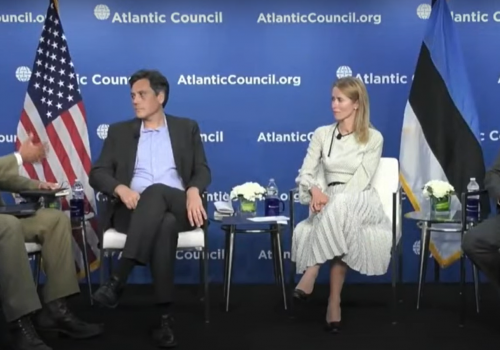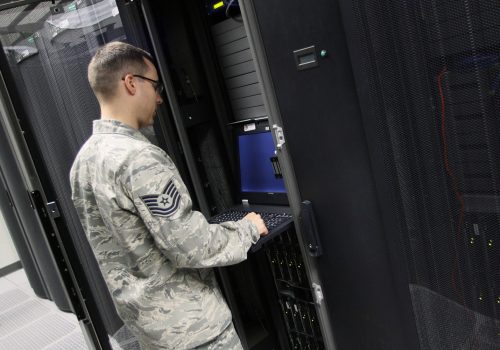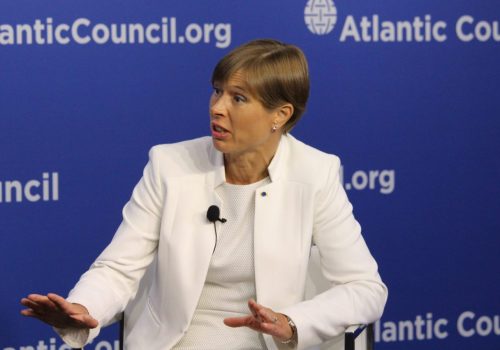On Wednesday, July 14, the Scowcroft Center’s Forward Defense practice area, the Digital Forensic Research Lab, the Europe Center, the GeoEconomics Center, and the GeoTech Center hosted Estonian Prime Minister H.E. Kaja Kallas, Congressman Ro Khanna of the seventeenth district of California, and US National Security Council’s Senior Director for International Economics and Competitiveness Peter Harrel for a discussion on securing digital infrastructure in light of twenty-first century digital challenges. Following the first conversation in the Trusted Connectivity Forum featuring Estonian President H.E. Kersti Kaljulaid, this event explored the need to find ways to counter the growing influence of authoritarian regimes in the digital space.
Prime Minister H.E. Kallas started the discussion by arguing for a global trust network, bringing her unique perspective as a head of government leading a nation world-renowned for its impressive e-governance. While emphasizing that the COVID-19 crisis has demonstrated the importance of these secure networks, she defined the key issues faced by the United States, Estonia, and other like-minded nations. In the twenty-first century, all infrastructure has a digital component and, in an age of growing authoritarianism, allies must work together to secure these components. Representative Khanna, a co-sponsor of an important bill which seeks to advance trusted infrastructure, and Mr. Harrell, who helps manage these issues on the National Security Council, joined H.E. Kallas to discuss solutions to this problem.
Throughout the discussion, all three panelists emphasized the need for government leadership in developing this important technological infrastructure. H.E. Kallas used Estonia’s strong and early history of e-governance to make this point, suggesting that the Estonian government led in the creation of digital identities long before Estonians themselves could see the real value in it. H.E. Kallas tellingly observed that, more and more, people are living their lives online and engaging directly with digital infrastructure, and that, if the government is absent from that space, “it just builds the divide between the government and how people really live.” Representative Khanna agreed, saying that it was important to design technology in a way that facilitated the needs of the citizenry. He brought attention to past US innovations and the country’s strength in research—research that is “not just about American leadership in the world [but] about the advancement of human civilization.” That research, he said, must be invested in. While he emphasized the need for innovation, he saw that these problems of trusted connectivity went much deeper and encompassed all values of liberal democracy, arguing that building values into our digital architecture will help citizens have equal representation in their democracies.
Mr. Harrell’s executive branch perspective helped blend H.E. Kallas and Representative Khanna’s ideas even further. He observed that developing and leading in digital infrastructure will help combat the growing trends of authoritarianism in the world, both domestically and as an exported policy. As China continues to expand its influence with the Belt and Road Initiative, Mr. Harrell emphasized that it was important for democracies to prove that they would be able to deliver at home and show “in real and tangible ways that we are prepared to provide alternatives to what autocracies are doing” to provide for the needs of the citizenry.
Each of the panelists established the need for clear, transformative investment across the transatlantic relationship. They each emphasized that there ought to be greater collaboration on issues like data governance and data privacy, with H.E. Kallas saying it was important to agree on the problems, and Mr. Harrell and Representative Khanna arguing that there are opportunities to work together in these regulatory spaces. Finally, H.E. Kallas emphasized that many of these global initiatives—the Three Seas Initiative, the Build Back Better World Initiative, and the Blue Dot Initiative, among others—could be brought together at the upcoming Tallinn Digital Summit on September 7, 2021.
You can re-watch the second event on “Trusted Connectivity: Securing digital infrastructure in an era of strategic competition with China” here. To view the first of these discussions, featuring President of Estonia H.E. Kersti Kaljulaid and US Deputy National Security Advisor for Cybersecurity and Emerging Technology Anne Neuberger, click here. For more information about the Atlantic Council’s Forward Defense practice or to read our latest reports, op-eds, and analyses, please visit the website here. You can also sign up for updates from Forward Defense to hear the latest on the trends, technologies, and military challenges shaping tomorrow.
Alyxandra Marine is a Young Global Professional in the Forward Defense practice of the Atlantic Council’s Scowcroft Center for Strategy and Security.



